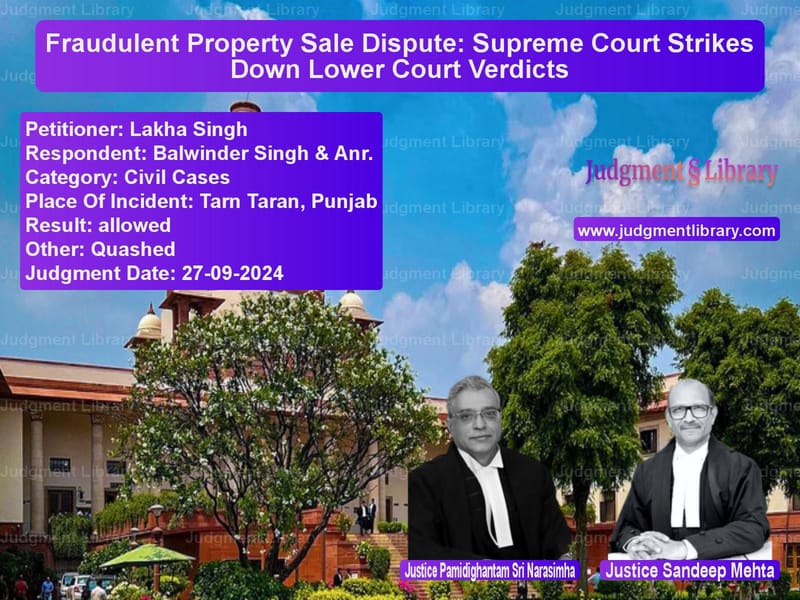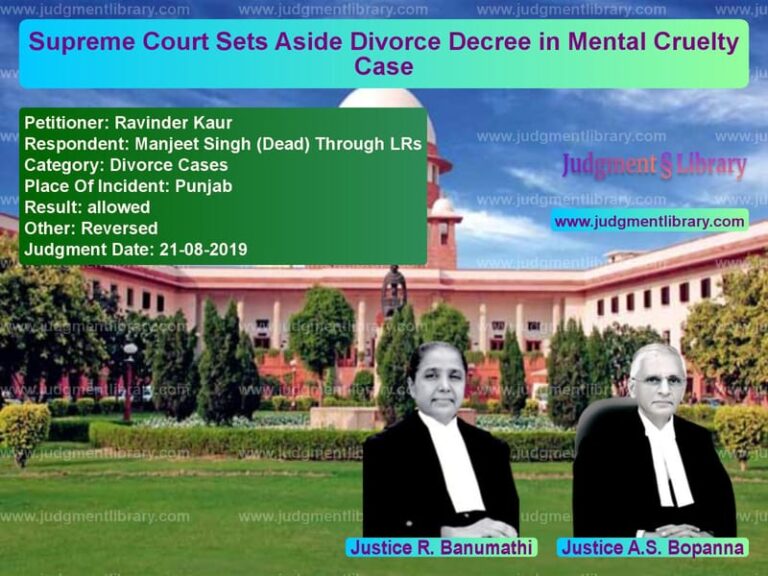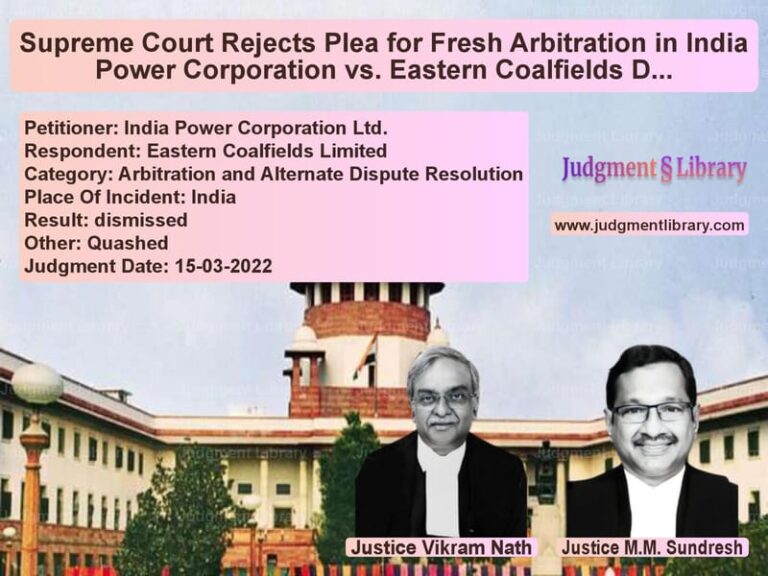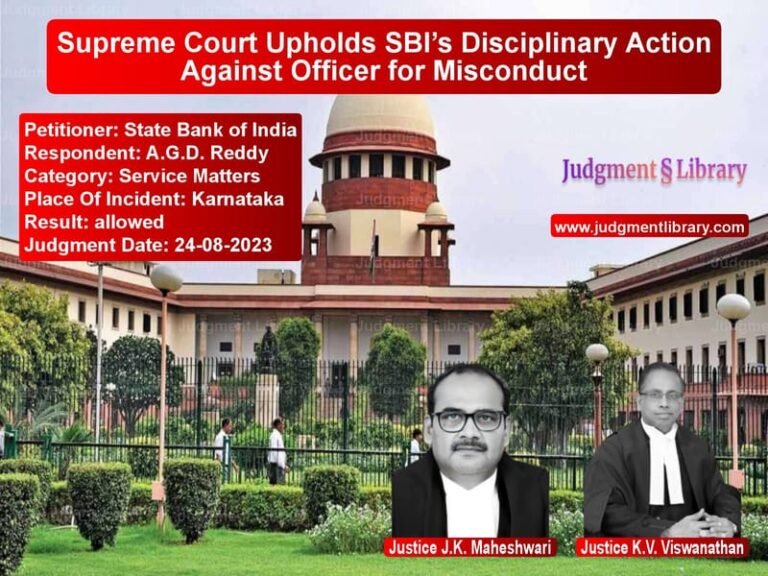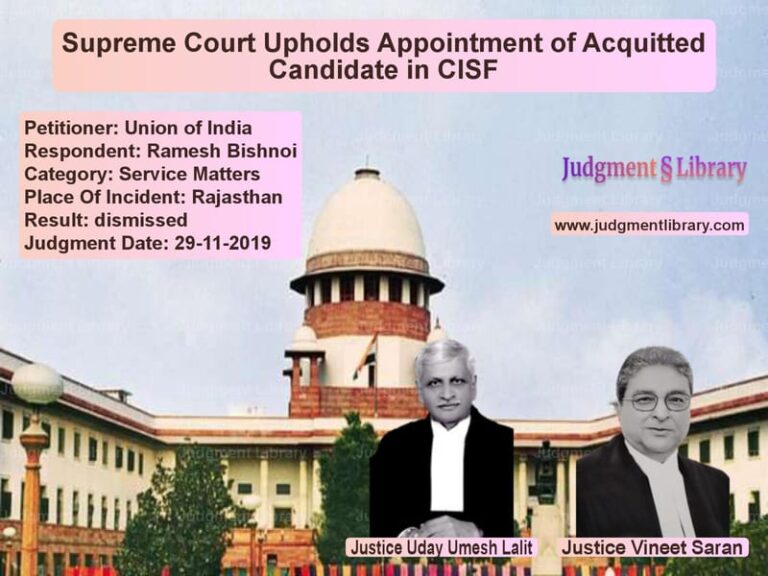Fraudulent Property Sale Dispute: Supreme Court Strikes Down Lower Court Verdicts
The Supreme Court of India recently delivered a crucial judgment in the case of Lakha Singh v. Balwinder Singh & Anr., which dealt with a complex property dispute involving allegations of fraudulent agreements and misrepresentation. The case revolved around a suit for the specific performance of an agreement to sell agricultural land, which ultimately led to a legal battle spanning multiple levels of the judiciary. The Supreme Court, in its final ruling, reversed the concurrent findings of the lower courts, citing significant inconsistencies and fraudulent misrepresentation in the agreement.
Background of the Case
The case began when the respondent, Balwinder Singh, filed a civil suit seeking the enforcement of an agreement to sell dated May 7, 2007, allegedly executed by the appellant, Lakha Singh. The disputed land, located in Village Amrike, Tehsil Patti, District Tarn Taran, Punjab, measured 30 Kanals and 8 Marlas. According to the plaintiff (respondent), the appellant had agreed to sell the land at a rate of Rs. 5,00,000 per Killa, receiving an earnest money advance of Rs. 16,00,000 on the date of the agreement.
The agreement stipulated that the sale deed would be executed and registered on September 19, 2008. The respondent claimed that he was present at the Sub-Registrar’s office on the designated date, waiting for the appellant, who allegedly failed to appear. The plaintiff further asserted that he had marked his attendance before the Sub-Registrar and obtained an affidavit attesting his presence.
Legal Proceedings and Arguments
Respondent’s (Plaintiff’s) Arguments
- The appellant had willingly entered into an agreement to sell the land and accepted a significant sum as an earnest deposit.
- The appellant failed to fulfill his contractual obligation by refusing to execute the sale deed.
- The respondent was in possession of the land as a prospective buyer.
- He had proven his readiness and willingness to complete the transaction by appearing at the Registrar’s office on the agreed-upon date.
Appellant’s (Defendant’s) Arguments
- The agreement was fraudulent and had been executed without his knowledge.
- The respondent’s brother, a commission agent, had taken the appellant’s thumb impressions on blank papers, which were later used to draft a forged agreement.
- The land in question was much more valuable than the agreed-upon price, making the sale unrealistic.
- The respondent failed to prove that he had paid the earnest money.
Supreme Court’s Observations
Justice Pamidighantam Sri Narasimha, delivering the verdict, highlighted several inconsistencies in the lower court judgments. He stated:
“The disputed agreement appears to have been prepared fraudulently. The large blank spaces on the first and second pages of the agreement, the absence of signatures on those pages, and the failure to produce independent witnesses raise serious doubts about its authenticity.”
The Court also noted that:
- The respondent failed to demonstrate that he had withdrawn or possessed Rs. 16,00,000 in cash to pay the earnest money.
- The land’s market value was significantly higher than the agreed sale price, making the transaction highly suspicious.
- The respondent did not notify the appellant in advance about appearing at the Registrar’s office, further weakening his claim.
Key Findings and Judgment
- The Supreme Court ruled that the agreement to sell was not legally enforceable due to fraudulent misrepresentation.
- It set aside the judgments of the trial court, the first appellate court, and the High Court of Punjab and Haryana.
- The appellant was not liable to return any amount as no valid sale agreement was proven.
- The appeal was allowed, and the respondent’s suit was dismissed.
Implications of the Judgment
The ruling establishes an important precedent in cases involving property disputes and fraudulent agreements. The key takeaways from this judgment include:
- Burden of Proof: A party alleging the execution of an agreement must conclusively prove that the document was not obtained through fraudulent means.
- Genuineness of Agreements: Courts will scrutinize agreements for inconsistencies, particularly in cases where land values appear to be grossly undervalued.
- Possession and Readiness: Merely marking attendance at the Registrar’s office does not establish a valid claim of readiness and willingness to perform a contract.
- Fraudulent Claims: This ruling acts as a deterrent against fabricated agreements designed to exploit legal loopholes.
Conclusion
The Supreme Court’s ruling in Lakha Singh v. Balwinder Singh & Anr. is a significant judgment that protects landowners from fraudulent property claims. By setting aside lower court findings, the Court reaffirmed the principle that property transactions must be backed by credible evidence and legally sound agreements. The judgment serves as a reminder that courts will not hesitate to strike down fraudulent claims and ensure that justice prevails.
Petitioner Name: Lakha Singh.Respondent Name: Balwinder Singh & Anr..Judgment By: Justice Pamidighantam Sri Narasimha, Justice Sandeep Mehta.Place Of Incident: Tarn Taran, Punjab.Judgment Date: 27-09-2024.
Don’t miss out on the full details! Download the complete judgment in PDF format below and gain valuable insights instantly!
Download Judgment: lakha-singh-vs-balwinder-singh-&-an-supreme-court-of-india-judgment-dated-27-09-2024.pdf
Directly Download Judgment: Directly download this Judgment
See all petitions in Property Disputes
See all petitions in Contract Disputes
See all petitions in Specific Performance
See all petitions in Judgment by P.S. Narasimha
See all petitions in Judgment by Sandeep Mehta
See all petitions in allowed
See all petitions in Quashed
See all petitions in supreme court of India judgments September 2024
See all petitions in 2024 judgments
See all posts in Civil Cases Category
See all allowed petitions in Civil Cases Category
See all Dismissed petitions in Civil Cases Category
See all partially allowed petitions in Civil Cases Category

